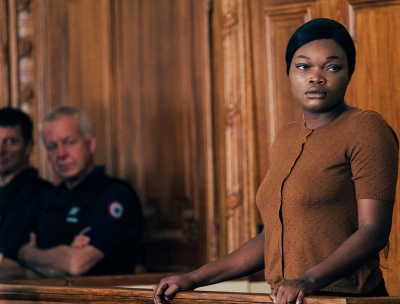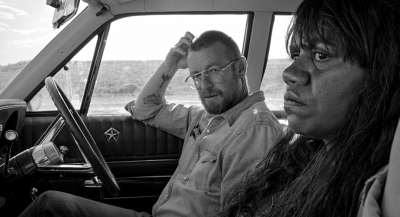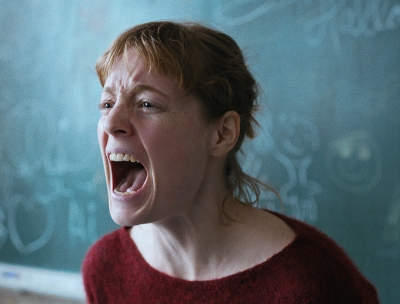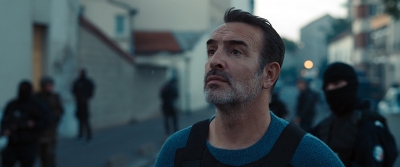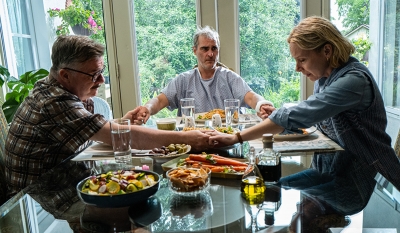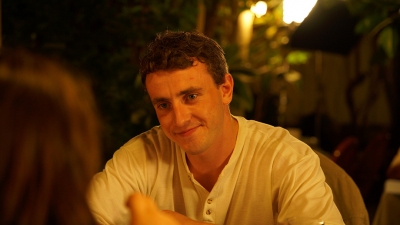Film
Women look at women in Saint Omer, and they look at each other looking. We look at them looking. In what is almost the opening scene of the film, a writer and academic named Rama (Kayije Kagame) lectures to a class of undergraduates, mostly young women. They are watching footage from the aftermath of World War II: women who slept with German soldiers are loaded onto carts, their heads shorn, and paraded through the streets as collaborators. ... (read more)
At one moment in Ivan Sen’s new film Limbo (Bunya Productions), I suddenly felt as though I was watching a German Expressionist film from the 1920s, that era in silent cinema when the expressive power of the image reached its zenith, when mood emanates from every surface and character was crafted by an indivisible composite of elaborately constructed sets, sculptural lighting, texture, composition, and the gestural and postural performance of actors. ... (read more)
Frau Carla Nowak (Leonie Benesch) stands in front of her class. A student volunteers a solution to the mathematical problem on the board. Carla responds, ‘Is that proof, or an assertion?’ This question will come to haunt Carla later, when it re-emerges in the school’s socio-political context, far messier than mathematics.
... (read more)There have been nuanced treatments of the November 2015 Paris attacks, including the docuseries November 3: Attack on Paris (2018), the excellent En thérapie (2021), which deals with post-traumatic stress in a counterterrorist agent who is also a Muslim, and Mikhaël Hers’ sublime human drama Amanda (2018) which looks at the aftermath of terrorism in an understated fashion. ... (read more)
When you wake up from a nightmare, it can feel so vivid, so real – so relevant. But over the following minutes and hours, your brain undertakes the important task of synthesising what your subconscious has subjected you to; it interprets symbols, recognises familiar anxieties, and likely suggests that you refrain from boring everyone you encounter that day with a blow-by-blow account of it all. ... (read more)
There is a boldness to veteran Polish writer-director Jerzy Skolimowski’s latest feature EO, which received the 2022 Jury Prize at Cannes, in that its protagonist is not human, has no lines, but is instead a donkey. ... (read more)
It’s drizzling when an Aimee Mann song plays in Hirokazu Kore-eda’s Broker. You know the one: ‘Wise Up’, the scabrous number that soundtracks a famous sequence in Paul Thomas Anderson’s Magnolia (1999), whose central cast – united by various machinations of fate – sing along in some kind of deranged processional, each character downcast and seeking salvation in Mann’s lyrics. None appears; the track literally ends with the words ‘give up’. ... (read more)
Not much appears to happen in Aftersun, the first feature film of young Scottish director Charlotte Wells – unless you count the snooker games, scuba diving, mud baths, and other holiday activities. But don’t be fooled. Like the water polo players in one of the many watery scenes, all the grunt work takes place below the surface. All you have to do, as spectator, is sit back and look for the clues.
... (read more)In February 2019, artist Nan Goldin and the activist group she founded staged a ‘die-in’ at the Guggenheim Museum in New York. The group demanded that the Museum refuse further funding from the super-wealthy art-patron Sackler family, whose pharmaceutical arm, Purdue, produced and aggressively marketed the highly addictive prescription painkiller OxyContin. ... (read more)
Given the success of the film adaptation of his previous play, The Father (2020), with an Academy Award-winning lead performance from Anthony Hopkins and a slew of nominations for himself, it seems only natural that writer–director Florian Zeller should turn to another in his trilogy of plays, The Son, for his next film project. (Zeller’s play, Le Fils, had its première in Paris in 2018.) Co-written by famed English playwright Christopher Hampton and shot by cinematographer Ben Smithard, who both worked on the earlier film, The Son represents, in many ways, a consolidation of Zeller’s talents, even if it doesn’t quite reach the harrowing intensity of The Father. ... (read more)
Page 8 of 32


